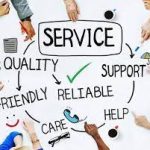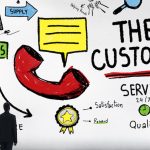
Customer service is essentially the provision of excellent service to clients prior to, during, and even after a sale. The impact of these interactions depends largely on how well employees “can adjust themselves to that of the customer”. When dealing with individuals, there is a much greater possibility for customer complaints when the customer is not treated courteously or has an unsatisfactory experience. One must therefore build structures and systems which will create an environment in which it will be easier for these individuals to deal with the salesperson. In this article, I present some strategies which can be used to cultivate good customer relationships.
Effective verbal communication is a very important driver of customer service. A salesperson’s ability to connect with and motivate people is key to their success as a manager and as a team leader. It is vital that you, as a manager, work to improve your verbal communication skills so that you can better engage with and motivate your own team. It is also important that you build upon the skills of your other team members so that they too are capable of communicating effectively and helping to keep your clients happy. The bottom line is that effective verbal communication is a key driver for your organization’s success.
Your support team is a key driver of your organization’s success too. If your support staff does not properly understand the goals and objectives of your organization, then they will have a difficult time effectively providing customer service. For example, if your customer service department is poorly organized, then they will not provide great customer support. Poor organization will result in poor performance from your support personnel. Poor performance will reflect directly back at you as the manager.
Another driver of your customer service success and satisfaction is product experience. If you are not skilled in providing product experience, then you may seem like a dry run to your clients. When you do product experience instead of theory-based or training based customer service, you will be able to see the problem from your customer’s point of view. Instead of responding to their complaints in a way that may seem like you’re not acknowledging their concerns at all, you will be able to respond to their complaints in a way that will make them feel heard and understood. You will be able to help your customers to resolve any issues that may come up in front of them.
Knowledge is another important skill to add to your list of customer service skills. When you attend seminars or take classes, you can learn more about these five skill sets. There are many good books and online resources that can teach you how to become an excellent driver of great customer service. You can also hire professional coaches who can help you master these skills and apply them to your daily operations.
In addition to learning these skills, you need to engage and network with other experts in your field. Many companies are using social media sites such as Facebook and Twitter to engage with their customers. These sites allow you to reach out to a new group of people who might be interested in your products and services. When you create a page for your company, you should invite people to like the page and join it. Once you have a large number of people who are fans of your company, you can use the social media site to promote the great customer service you provide. Not only will this help you to build up a fan base, but it can also help you draw in new customers.












